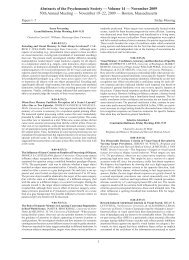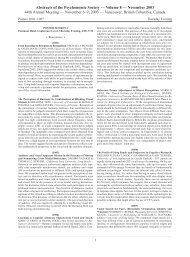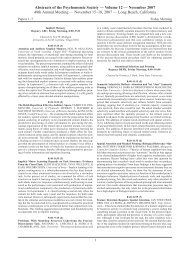Abstracts 2005 - The Psychonomic Society
Abstracts 2005 - The Psychonomic Society
Abstracts 2005 - The Psychonomic Society
You also want an ePaper? Increase the reach of your titles
YUMPU automatically turns print PDFs into web optimized ePapers that Google loves.
Saturday Afternoon Papers 262–264<br />
used to estimate independent externalization and internalization bias<br />
parameters by employing a novel statistical/cognitive model. <strong>The</strong> results<br />
provided support for a double dissociation: Hallucinating patients<br />
displayed evidence for an externalization but not an internalization<br />
bias, whereas delusional patients displayed evidence for an<br />
internalization but not an externalization bias. Neither symptom<br />
group displayed an increased likelihood of external source confusion.<br />
4:30–4:45 (262)<br />
Dissociation Between Control of Study Time Allocation and JOL<br />
in Patients With Schizophrenia. ELISABETH BACON, INSERM,<br />
MARIE IZAUTE, CNRS, & JEAN-MARIE DANION, INSERM—<strong>The</strong><br />
use of semantic tasks has revealed dysfunctional metamemory in schizophrenia.<br />
This study investigated whether patients with schizophrenia<br />
exhibit metamemory abnormalities during the encoding of episodic information.<br />
<strong>The</strong> frequency of item presentation was here varied. Both<br />
memory monitoring and memory control were then assessed using<br />
judgments of learning (JOLs) and study time allocation, respectively.<br />
Patients’ JOLs were lower than those of controls but remained sensitive<br />
to item repetition; patients’ predictive values on memory accuracy were<br />
not different from those measured in controls. However, patients’ patterns<br />
of response were abnormal when considering the study time allocated<br />
for each item in function of presentation frequency. In addition,<br />
none of the patients reported using efficient strategies to help memorize<br />
target items. <strong>The</strong>se results argue in favor of impaired strategic regulation<br />
of episodic memory encoding in schizophrenia.<br />
4:50–5:05 (263)<br />
Memory and the Korsakoff Syndrome: A Problem of Conscious Recollection<br />
at Retrieval. GÉRY D’YDEWALLE & ILSE VAN DAMME,<br />
University of Leuven—At study, participants generated an association<br />
or counted the number of letters with enclosed spaces or the number<br />
41<br />
of vowels in target words. At test, three-letter stems were presented.<br />
One group was instructed to use the stems to retrieve the targets; another<br />
group was instructed to complete the stems with the first word<br />
that came to mind but to use another word if that first word was a target<br />
word; and a third group was instructed to complete the stems, and<br />
no reference was made to the target words. A levels-of-processing effect<br />
appeared in almost all conditions, and when they were allowed to<br />
guess, the performance of Korsakoffs matched the performance of<br />
controls. However, Korsakoffs were unable to suppress the target<br />
words. Korsakoffs were also unable to indicate whether they remembered<br />
or simply knew an item, suggesting a lack of conscious recollection<br />
at test, despite the availability of the encoded items.<br />
5:10–5:25 (264)<br />
Dual-Task Coordination and Episodic Memory in Alzheimer’s and<br />
in Depression. ROBERT H. LOGIE, University of Edinburgh, REINER<br />
KASCHEL & FRANZISKA GOEHRKE-ARNDT, University of<br />
Giessen, & SERGIO DELLA SALA, University of Edinburgh—Our<br />
previous studies indicated that individuals with early-stage Alzheimer’s<br />
disease (AD) show substantial and reliable impairments in dual-task<br />
performance (digit recall with tracking) that are not present in healthy<br />
aging and are independent of single-task performance and of task demand.<br />
Episodic memory impairment is an additional characteristic of<br />
AD, but it also occurs in healthy aging and in other disorders of old<br />
age, such as chronic depression. This paper presents recent data demonstrating<br />
the robust nature of our previous results for AD and healthy<br />
aging, but also showing a lack of dual-task impairments in nondemented<br />
individuals suffering from chronic depression, despite the presence of<br />
episodic memory failures in the latter group. Results are interpreted<br />
as suggesting a specific dual-task coordination function within healthy<br />
multicomponent working memory that is affected by AD but not by<br />
age or depression.





